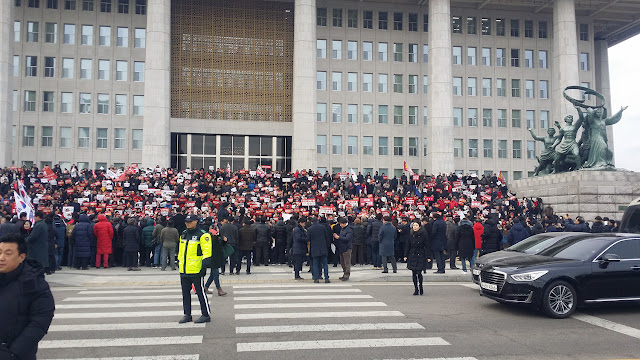[WARNING: lotsa spoilers.]
Let's make something very clear from the start: "Sorry to Bother You" is, among other things, a way-way-left anti-capitalism screed, but for most of its run time, it's also pretty damn funny. It's a good day when I can disagree so thoroughly with a movie's message but still like the movie itself. Directed by first-timer Boots Riley and starring Lakeith Stanfield, Tessa Thompson, Omari Hardwick, Terry Crews, Danny Glover, Steven Yeun, and Armie Hammer, "Sorry to Bother You" is about the rise and fall and rise and fall of harried telemarketer Cassius "Cash" Green (Stanfield).
Green lives with his girlfriend Detroit (Thompson) in the garage of his uncle Sergio (Crews), who is fed up with Cash for not paying the rent. Sergio is on the verge of losing his property, which is partly what motivates Cash to beg for work at a telemarketing firm called RegalView. Cash is caught lying during the interview for the job, but the boss interprets this as the chutzpah needed to make sales, so Cash is hired. Once he's on the team, Cash finds himself unable to make any sales despite the prospect of becoming a PC, i.e., a "Power Caller": someone who moves upstairs, receives a massive raise, and engages in a whole new level of salesmanship. An older coworker (Danny Glover!) informs Cash that, to make sales, he just needs to learn to use his "white voice," which will go over more smoothly with his mostly white interlocutors. Once Cash makes the switch to the white voice, he becomes a sales-closing monster who catches the eyes of the bosses.
RegalView has been screwing its employees over, though, and the ground-floor telemarketers are organizing themselves into a labor union led by Squeeze (Yeun). Cash's girlfriend Detroit, an avant-garde artist who twirls signs on the side, also joins RegalView—just in time to be part of the protest movement against the company. When the workers decide to stage a twenty-minute strike during which they make no sales calls, Cash joins in. The bosses pull Cash aside and, instead of firing him, inform him that he's been promoted to the status of Power Caller. Cash gives in to temptation and moves to the upper floors, where life at RegalView is completely different from the hellhole of ground-floor telemarketing. Even the electronic voice of the elevator that Cash rides to the upper floors (voiced lusciously by Rosario Dawson) coos sexily at Cash, praising his masculinity, intellect, and sexual prowess.
Cash finds himself in a moral dilemma: (1) stick with a job at which he's a proven talent, abandoning his friends, his girlfriend, and his own principles, or (2) leave the Power Calling behind and live a more authentic, less corporate-drone existence. Cash stays with the PC work, which eventually puts him in contact with RegalView's biggest client, a company called WorryFree, which essentially enslaves its workers for life, gathering an ever-growing workforce of cheap labor. WorryFree's CEO, self-help guru Steve Lift (Hammer), eventually invites Cash to a party where he reveals to Cash what WorryFree's master plan is: to use a mutagen that changes humans into half-horse humanoids called equisapiens—workers who are stronger and faster, but also more docile and easily trainable. Lift wants Cash to become an equisapien himself so that Cash can act as a liaison between the horse-people and regular humans. Despite an offer of $100,000,000 paid out over five years, Cash is horrified, and because he has just snorted some coke in front of Lift, he's also worried that the "coke" might actually be the aforementioned mutagen.
How does Cash resolve his dilemma? Does he pick his career over his girl? I think you already know the answer to that one; if there's one thing this movie doesn't do well, it's disguise where it's going next (except, admittedly, for one major twist as the credits roll). With an obvious moral and political agenda, the movie makes itself both very predictable and extremely preachy. But it's also hilariously absurdist and willing to leaven its heavy-handed message with a megadose of morbid black comedy that covers the themes and topics of race, capitalism, and what it means to be human and free.
But none of this is done subtly, so if you go into "Sorry to Bother You" expecting nuance, you're going to be disappointed. Far from using oblique metaphors, director Boots Riley goes for a kind of magical-realist literalism: when Riley argues that corporations dehumanize you, he means they literally take away your humanity. Cash is a case in point (and note that "Cassius Green" sounds like "cash is green," and that Dante's ninth circle of hell in his Inferno has only three victims languishing in it—Judas, Brutus, and Cassius, all betrayers): first, he loses his regular "black" voice in favor of a white voice (white voices are literal overdubs by white actors—David Cross and Patton Oswalt, for the most part); he then experiences horror when he sees, up close, human workers who have been transformed into equisapien beasts. The Marxist idea that people are never paid what they're worth (I do agree with this notion, actually) is sprinkled throughout the plot, and there's even a scene in which Detroit, doing performance art at her gallery, allows herself to be humiliated by her audience in a way that symbolizes the white-capitalist world's centuries-long exploitation of the black man.
There's a lot I could say in reply to what I see as a big pile of self-deluded ideological garbage, but instead of wasting your time with those arguments, I'd rather note that, first, the movie did force me to do some thinking about some of the justice issues it put on display. Second, for most of its run time, the movie really is damn funny, and if you're going to make a political or philosophical argument, humor is the best vehicle for doing so. Third, I was very impressed with Boots Riley's talent as a director. I think he's going places. His freshman effort strikes me as something of a love child from two Spikes: Spike Lee, whose social-commentary DNA is apparent in this film, and Spike Jonze, whose absurdist sensibilities would applaud scenes of horse-men with huge, flopping dicks running rampant through the city, assaulting police (who are, of course, part of the oppressive power structure).
Twice now, I've noted that the movie was funny for most of its run time. In the final reel, the film's tone changes markedly to something deadly serious, and even though the absurdity is still there, it plays second fiddle to the way in which the film's various issues come to the fore and dominate the plot. Corporations are portrayed not merely as dehumanizing, but as actively murderous: part of a network of arms-selling, destruction, and mayhem, all in the name of the almighty dollar. Capitalism is a soul-crushing reality that must be stopped.
But strangely, despite the film's trenchant critique of how modern America is seemingly structured, no proactive solutions are actually offered beyond a vague suggestion to live more authentically, to remember one's friends and one's loves, and, perhaps, to unionize wherever corporate oppression is to be found. The scenes of chaos in the final reel might be said to reflect a Marxist eschaton, an uprising of the proletariat and the institution of a glorious new order, but I don't think this is the only way the movie can be interpreted.
Despite the movie's lack of subtlety in the ideology department, despite its confrontation of problems without providing real solutions, I found "Sorry to Bother You" to be a kind of black version of a Tom Wolfe novel... although maybe that's the wrong thing to say, given that Wolfe tended to lampoon everyone equally, whereas Boots Riley's film is painfully one-sided. In the end, I was entertained by the story but repulsed by the message.
And let me give in to my inner barbarian and say that Tessa Thompson has never looked hotter. Damn. And you have to love her ever-changing earrings.
On a personal note, I'll confess that, in my youth, during a period of financial desperation, I did telemarketing for two weeks at a place with the über-generic name of Dealer Broker Trust—a proper noun constructed entirely of common nouns. When I first went to the initial training session (where, just as in this movie, we were given a phone script and told to stick to it no matter what), I sat in a carpeted cellar with a handful of other desperate souls, and we listened to a telemarketing pitch from a smarmy-looking guy who wowed us with promises of how much we could make if we managed even a ten-percent closure rate. The dollar figures the guy wrote on the whiteboard got bigger and bigger (remember: if you're gonna lie, lie big), and we all left the session, scripts in hands, pumped and ready to make those dang calls. Once I got home and began cold-calling, though, it quickly became obvious that I wasn't going to get anywhere near a ten-percent closure rate. If I recall correctly, I didn't close a single sale. And for the life of me, I can't even remember what the hell I was selling. Two weeks of that discouraging nonsense was enough to knock some sense back into me, and I eventually found real work. Yes: telemarketing is degrading and dehumanizing. Yes: the company sees you as a replaceable cog in the machine (which is also true at my current job!). Yes: you suck if you're working at telemarketing. Conan, what is best in life? To be your own boss, to be separate from and un-beholden to any power structures, and to live on your own terms.
The latter two items are actually consonant with the movie's message.































